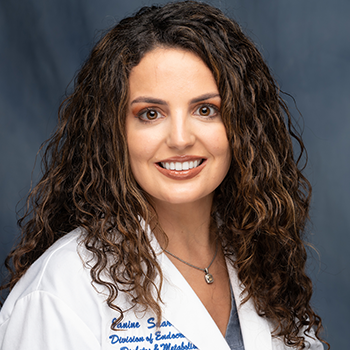Lloyd Aiello, MD, PhD
-
Academic Faculty, Clinical Provider, Researcher
-
Adult Diabetes
-
Vascular Cell Biology
Senior Investigator and Ophthalmologist
Director, Beetham Eye Institute
Section Head, Vascular Cell Biology
Professor of Ophthalmology, Harvard Medical School
Assistant Professor of Ophthalmology, Harvard Medical School
Dr. Lloyd Paul Aiello is a graduate of the University of Pennsylvania and received his MD and PhD (biochemistry) degrees from Boston University School of Medicine. He completed his residency in ophthalmology at the Wilmer Ophthalmological Institute at Johns Hopkins University and Hospital before coming to Joslin Diabetes Center. At Joslin Diabetes Center he completed both a clinical vitreoretinal fellowship and a research fellowship before joining the Joslin staff in 1994.
Dr. Aiello is Professor of Ophthalmology at Harvard Medical School, Vice Chair for Centers of Excellence at Harvard Department of Ophthalmology, Director of the Beetham Eye Institute of Joslin Diabetes Center (JDC), Medical Director of Ophthalmology and Brigham & Women’s Hospital, Head of the Section of Eye Research (JDC), Vice President of Ophthalmology at JDC, and Founding Chair of the National Eye Institute Diabetic Retinopathy Clinical Research Network. He has served as Chair for the Lions Club International SightFirst Diabetic Retinopathy Research Program Review Panel, the Complications Section, of the Juvenile Diabetes Research Foundation (JDRF) Medical Science Review Committee and the Clinical Investigation Section of the JDRF.
Dr. Aiello and his co-workers are investigating the molecular mechanisms responsible for both early diabetic retinopathy and the more advanced complications of retinal diseases, including diseases of the macula in the eye. This information is used to determine potential therapeutic targets and then studies proceed to evaluation of the resulting new treatment approaches in animals and subsequent development and implementation of human clinical trials. These studies may help develop novel, non-invasive therapies providing new treatment options for diabetic retinopathy, diabetic macular edema and other ischemic retinal vascular disorders which currently account for the majority of blindness among working-age Americans.
Dr. Aiello's laboratory has had significant research efforts focusing on understanding the expression, regulation, and signalling of vascular endothelial growth factor (VEGF) and its receptors. Dr. Aiello and Dr. King's laboratory reported several years ago that VEGF, a major growth factor which can be regulated by hypoxia, is elevated in the fluids of the eye (both vitreous and aqueous)in diabetic patients with proliferative retinopathy. The increased levels of VEGF are normalized when proliferative retinopathy is in remission due to either vitrectomy or laser photocoagulation of the retina. Dr. Aiello has extensively studied the regulation of the expression of VEGF and its receptors by hypoxia, high glucose, diabetes and other mediating factors such as bFGF. Studies have also determined the signaling mechanisms for VEGF in retinal cells. These studies served the basis for many subsequent clinical studies which have recently demonstrated that VEGF inhibitors are very effective at improving vision in patients with diabetic macular edema.This treatment is rapidly becoming standard care now for this complication of diabetes.
Studies over the last few years with Dr. Feener at Joslin have begun to elucidate nonVEGF mechanisms that may account for the approximately 40% of patients who do not respond robustly to VEGF inhibitors. These pathways involving carbonic anhydrase and plasma kallekrein are being targeted for novel interventional therapies to be tested as potential treatments to prevent visual loss in patients with diabetic macular edema refractory to VEGF inhibitors.
Other studies with Dr. Aiello’s close collaborator Dr. George L. King, have led to the demonstration that the beta isoform of the enzyme Protein Kinase C mediates many of the detrimental changes of diabetes in the eye. A selective inhibitor of PKC-beta has been developed by Dr. King which prevents many of the abnormal changes associated with diabetes both in cell culture and in animal models. This inhibitor, which is given orally, is now in phase 3 clinical trials to determine if it can delay or prevent the development of proliferative diabetic retinopathy or sight threatening diabetic macular edema.
In addition, Dr. Aiello and his team have spearheaded rigorous clinical trial research in diabetic eye disease that have evaluated and helped define the role of PKC beta inhibitors, intraocular steroids, laser photocoagulation techniques, vitamins, ocular coherence tomography, autorefraction, PPAR gamma agonists and VEGF inhibitors. He was the inaugural chair of the Diabetes Clinical research Network, now the largest national network evaluating new clinical interventions for ocular complications of diabetes
College: University of Pennsylvania
Graduate School: Boston University
Medical School: Boston University School of Medicine
Internship: Framingham Union Hospital
Residency: Johns Hopkins Hospital Wilmer Institute
Fellowship: Joslin Diabetes Center
Certification: Ophthalmology

Related Experts


